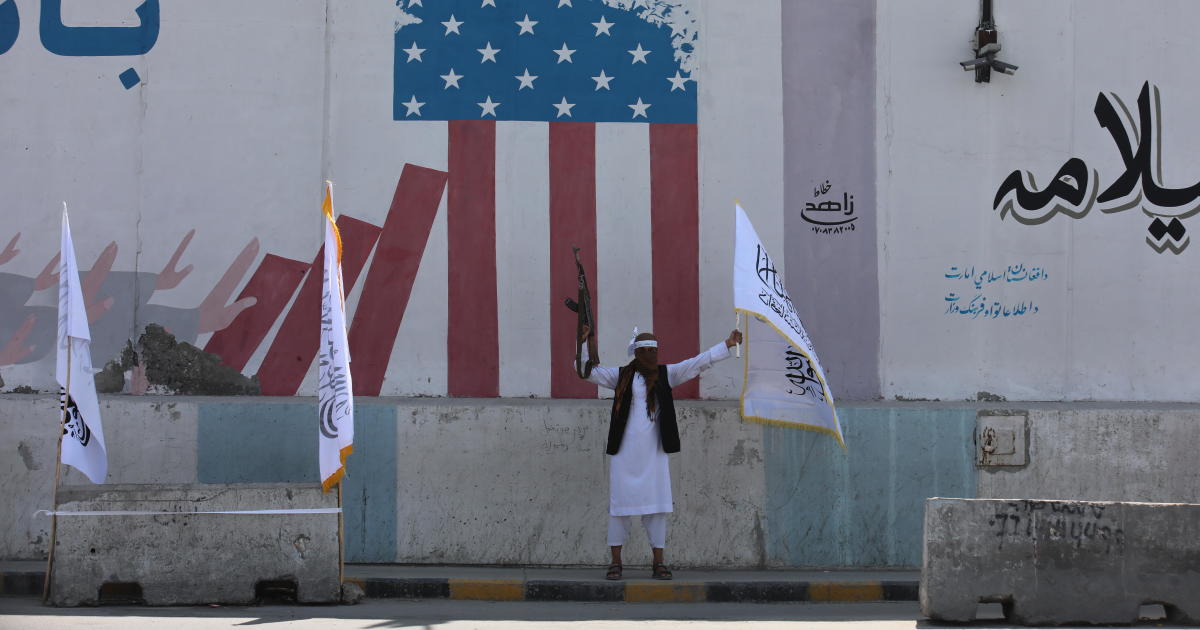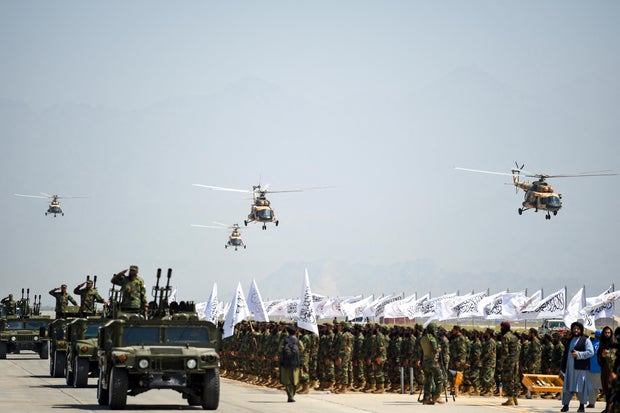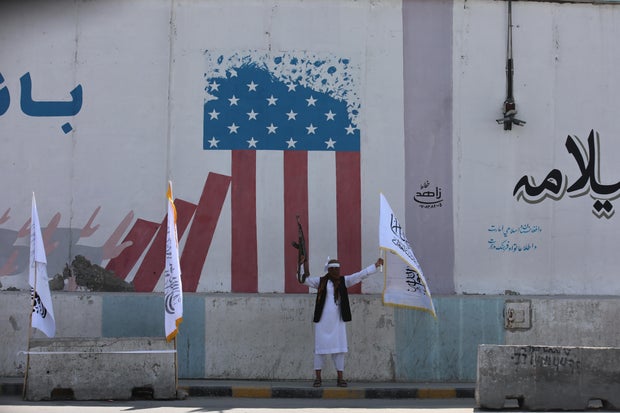The last U.S. troops left Afghanistan on Aug. 30, 2021. Three years later, the Taliban’s return to power has allowed al Qaeda and other terrorist groups to regain a presence in the country, and deprived Afghan women and girls of basic freedoms they were granted during two decades of Western-backed government following the U.S.-led invasion in 2001.
In a show of force to mark their third year in power, the Taliban held a parade at Bagram Airfield earlier this month. The sprawling base was the primary hub for U.S. troops in Afghanistan as they hunted Taliban and al Qaeda militants in the 20 years after the Sept. 11 terrorist attacks on the U.S.
The Taliban used the parade to show off U.S. and NATO military equipment abandoned by the foreign forces when they left in a chaotic withdrawal.
AHMAD SAHEL ARMAN/AFP/Getty
Taliban fighters also gathered in a diplomatic district of Kabul, outside the now-abandoned U.S. embassy compound, chanting “death to America” as they trampled a U.S. flag that had trailed from the back of a Ford truck previously used by the U.S.-backed police force.
“Intolerable restrictions on the rights of Afghan women”
Afghan women and girls have suffered enormously under the Taliban’s authoritarian rule. The new government has issued dozens of draconian edicts, systematically excluding women and girls from public life, depriving them of education and employment and subjecting them to detention and even physical assault for daring to advocate for their fundamental rights.
Under the Taliban, Afghanistan has become the only country in the world where girls and women are prohibited from pursuing secondary and higher education.
Last week, the Taliban announced yet more restrictions under the guise of a new “vice and virtue” law. One of the law’s 35 articles declares that women’s faces and voices are sources of temptation that must not be heard or seen in public.
“When a mature woman needs to leave her home, she must cover her face, body, and make sure that her voice is not heard,” according to the law.
The measures also bar Afghan women from engaging with “infidel women,” and men from associating with “infidel foreigners,” using a term that generally refers to non-Muslims. Men can also be imprisoned for listening to music, shaving or trimming their beards or wearing neckties.
“It is a distressing vision for Afghanistan’s future, where moral inspectors have discretionary powers to threaten and detain anyone based on broad and sometimes vague lists of infractions,” said Roza Otunbayeva, the Special Representative of the United Nations Secretary-General who also heads the U.N.’s mission in Afghanistan, in a statement on Sunday.
She said the new law “extends the already intolerable restrictions on the rights of Afghan women and girls, with even the sound of a female voice outside the home apparently deemed a moral violation.”
According to UNESCO, more than 1.4 million girls are being deliberately deprived of schooling in Afghanistan, putting the future of an entire generation in jeopardy.
The Taliban has also reinstated public flogging of people accused of various crimes, with authorities lashing hundreds of people over the past three years.
“The Taliban have created the world’s most serious women’s rights crisis since taking power,” said the New York-based group Human Rights Watch. “Under the Taliban’s abusive rule, Afghan women and girls are living their worst nightmares.”
The return of al Qaeda and the threat of ISIS-K
A year after the U.S. and NATO withdrawal from Afghanistan, a U.S. drone strike killed al Qaeda leader Ayman al-Zawahiri in Kabul’s diplomatic district, but since then, the terrorist group responsible for the 9/11 attacks has reemerged and established new training facilities in the country.
A U.N. Security Council report published in July said al Qaeda had regrouped in Afghanistan and warned that it was aiming to conduct attacks beyond the country’s borders.
“Al Qaeda remains strategically patient, cooperating with other terrorist groups in Afghanistan and prioritizing its ongoing relationship with the Taliban,” the U.N. report said, adding that it was operating “covertly in order to project the image of Taliban adherence to the provisions of the Doha agreement,” which the Taliban negotiated with the U.S. under former President Donald Trump.
That deal saw the Taliban promise not to let any terrorist group find safe operating space in Afghanistan, but the U.N. report also noted the recent arrival of new al Qaeda members in the country, including a Libyan who it said was working at the Taliban’s Ministry of Interior. The individual has “no clear job description and has been issued an Afghan passport,” the report said.
The regional ISIS affiliate, known as ISIS Khorasan, ISIS-K or ISKP, also poses a rising threat, with members having successfully infiltrated Afghanistan’s Taliban-run security ministries, according to the U.N.
Despite losing territory since the Taliban takeover, which has limited ISIS-K operations in the country, the group remains a significant threat to the region and beyond, the report said.
Deadly attacks over the last year in Moscow and Iran, and foiled plots in Europe, all show the group’s capacity to plan violence despite the Taliban’s security forces actively hunting its members.
“The Taliban have the will to fight against ISKP. They are really committed to do that, but they are lacking in operational capability to conduct really effective counterterrorism against the ISKP,” Arian Sahrifi, a lecturer at the Princeton School of Public and International Affairs, said during a recent webinar.
Hafiz Zia Ahmad, a deputy spokesman for Afghanistan’s Taliban-run Ministry of Foreign Affairs, declared Afghanistan “a safe and stable country” in a social media post last week, claiming that Taliban forces had “successfully neutralized” ISIS-K in Afghanistan.
Dozens of Afghans stuck and still waiting for refuge
Dozens of people who were evacuated to third countries as the Taliban came back to power are still waiting to be relocated to the U.S. or Canada, including former government officials and Afghan forces. One of them is a man who piloted one of the helicopters used by then-Afghan President Ashraf Ghani to escape to Tajikistan.
Others include members of the former Afghan president’s protection services, former members of the Afghan Special Forces who worked directly with U.S. and NATO troops in the fight against the Taliban, and other high-ranking officials.
“We are in a modern prison,” Qazizada, a former Afghan government prosecutor who’s been stuck in a humanitarian camp in Abu Dhabi since October 2021, told CBS News.
Qazizada, who declined to give his full first name for this article to protect family members still in Afghanistan, said more than 60 people, including 48 women and children, were stranded at the camp with him — all facing an uncertain future three years after their escape.
He said family members of Ghani’s helicopter pilot and personal security detail were still hiding in Afghanistan.
“Every time their kids ask when you come home, we can’t hold back our tears,” Qazizada said. “The mental situation of women and children in the camp and in Afghanistan is very dire. Some are even contemplating suicide to end their suffering, but we try to give them hope.”
“Almost all of us are taking [anti]depression pills,” he said.
A significant number of former Afghan security forces sought refuge in neighboring Pakistan and Iran when the Taliban took back over, but many were later repatriated by those countries to Afghanistan.
In the first six months of 2024, the U.N. mission in Afghanistan said it had documented at least nine cases of extrajudicial killings of former members of the security forces and nearly 100 instances of arbitrary arrests.
Relation with U.S. adversaries
While no country has formally recognized the Taliban regime as the new government of Afghanistan since its takeover in 2021, two U.S. adversaries, Russia and China, have granted the regime support on the international stage.
In a recent interview with a local TV network, the Taliban government’s deputy prime minister said the group had two allies in the U.N. Security Council with veto power. He didn’t name them, but of the five permanent Council members that have veto power, he could only have been referring to Russia and China. Counting them as allies gives the regime a diplomatic advantage it didn’t have during its previous period in power, potentially shielding it from any Security Council resolutions seeking action against the Taliban over its policies.
Bilal Guler/Anadolu/Getty
China, which shares a border with Afghanistan, is the only country to have sent an ambassador to Afghanistan, and leader Xi Jinping has accepted the accreditation of a Taliban ambassador to Beijing. The two countries have signed several mining contracts since the Taliban’s return to power.
Russia, meanwhile, said in May that it would soon remove the Taliban from its list of state sponsors of terrorism, which would lead to normalization of relations between the two countries. The Taliban welcomed the announcement and sent a delegation to visit Moscow.
#Afghanistan #years #Taliban #rule #Women #silenced #oppressed #ISIS #Qaeda #regroup



